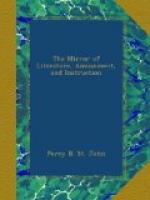“The British warriors preserved the bones of their enemies whom they slew; and Strabo says of the Gauls (who were, as he informs us, far less uncivilized than the Britons, but still nearly resembled them in their manners and customs,) that when they return from the field of battle they bring with them the heads of their enemies fastened to the necks of their horses, and afterwards place them before the gates of their cities. Many of them, after being anointed with pitch or turpentine, they preserve in baskets or chests, and ostentatiously show them to strangers, as a proof of their valour; not suffering them to be redeemed, even though offered for them their weight in gold. This account is also confirmed by Diodorus. Strabo says that Posidonius declared he saw several of their heads near the gates of some of their towns,—a horrid barbarism, continued at Temple-bar almost down to the present period.”
Lastly, Speaking and Moving Stones:
“Girald Cambrensis gives an account of a speaking-stone at St. David’s in Pembrokeshire. ’The next I shall notice is a very singular kind of a monument, which I believe has never been taken notice of by any antiquarian. I think I may call it an oracular stone: it rests upon a bed of rock, where a road plainly appears to have been made, leading to the hole, which at the entrance is three feet wide, six feet deep, and about three feet six inches high. Within this aperture, on the right hand, is a hole two feet diameter, perforated quite through the rock sixteen feet, and running from north to south. In the abovementioned aperture a man might lie concealed, and predict future events to those that came to consult the oracle, and be heard distinctly on the north side of the rock, where the hole is not visible. This might make the credulous Britons think the predictions proceeded solely from the rock-deity. The voice on the outside was distinctly conveyed to the person in the aperture, as was several times tried.’—Arch. Soc. Ant. Lond. vol. viii.
“The moving stones, or Logans, were known to the Phoenicians as well us the Britons. Sanconiatho, in his Phoenician History, says, that Uranus devised the Boetylia, Gr.; Botal or Bothal, Irish; Bethel, Heb., or stones that moved as having life.—Damascius, an author in the reign of Justinian, says he had seen many of these Boetylia, of which wonderful things were reported, in Mount Libanus, and about Heliopolis, in Syria.”
The volume, a handsome octavo of more than 500 pages, has been, we perceive, published by subscription: the list contains about 400 names, with the King at the head. This is sterling patronage, yet not greater, if so great, as Mr. Pennie deserves. The Preface, we think, somewhat unnecessarily long: it needed but few words to commend the drama of our early history to the lovers of literature, among whom we do not reckon him who is insensible to the charms of such plays as Cymbeline, Julius Caesar, the Winter’s




